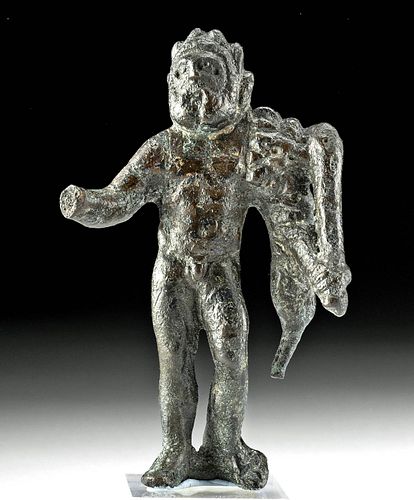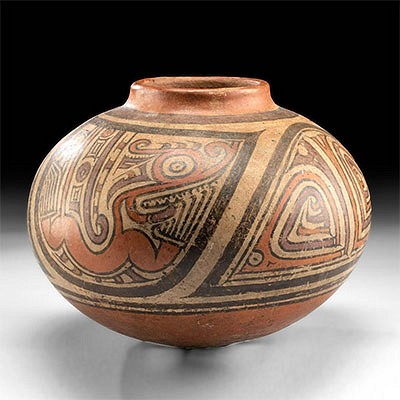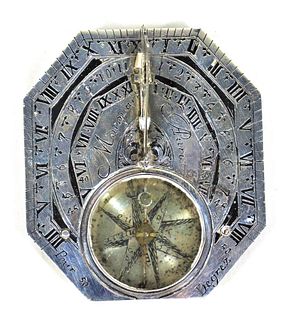Roman Leaded Bronze Hercules w/ Nemean Lion Skin & Club
Lot 33a
About Seller
Artemis Fine Arts
686 S Taylor Ave, Ste 106
Louisville, CO 80027
United States
Selling antiquities, ancient and ethnographic art online since 1993, Artemis Gallery specializes in Classical Antiquities (Egyptian, Greek, Roman, Near Eastern), Asian, Pre-Columbian, African / Tribal / Oceanographic art. Our extensive inventory includes pottery, stone, metal, wood, glass and textil...Read more
Categories
Estimate:
$1,200 - $1,800
Absentee vs Live bid
Two ways to bid:
- Leave a max absentee bid and the platform will bid on your behalf up to your maximum bid during the live auction.
- Bid live during the auction and your bids will be submitted real-time to the auctioneer.
Bid Increments
| Price | Bid Increment |
|---|---|
| $0 | $25 |
| $300 | $50 |
| $1,000 | $100 |
| $2,000 | $250 |
| $5,000 | $500 |
| $10,000 | $1,000 |
| $20,000 | $2,500 |
| $50,000 | $5,000 |
| $100,000 | $10,000 |
| $200,000 | $20,000 |
About Auction
By Artemis Fine Arts
Apr 15, 2021
Set Reminder
2021-04-15 10:00:00
2021-04-15 10:00:00
America/New_York
Bidsquare
Bidsquare : VARIETY SALE | Ancient & Ethnographic Art
https://www.bidsquare.com/auctions/artemis-gallery/variety-sale-ancient-ethnographic-art-6811
Featuring classical antiquities, ancient and ethnographic art from cultures encompassing the globe. Egyptian, Greek, Roman, Etruscan, Near Eastern, Asian, Pre-Columbian, Native American, African / Tribal, Oceanic, Spanish Colonial, Russian, Fossils, Fine Art, more! Artemis Fine Arts info@artemisgallery.com
Featuring classical antiquities, ancient and ethnographic art from cultures encompassing the globe. Egyptian, Greek, Roman, Etruscan, Near Eastern, Asian, Pre-Columbian, Native American, African / Tribal, Oceanic, Spanish Colonial, Russian, Fossils, Fine Art, more! Artemis Fine Arts info@artemisgallery.com
- Lot Description
Roman, Imperial Period, ca. 1st to 3rd century CE. A cast leaded-bronze statuette depicting Hercules (Greek Herakles, Heracles) standing in quintessential contrapposto pose with the Nemean lion's skin draped over his left shoulder, his intimidating club held in his left hand, and his right arm extended. The iconography of this bronze references the legendary hero's first labor when King Eurystheus asked Hercules to bring him the skin of a fierce lion that terrorized the hillside around Nemea - a seemingly impossible task. Despite the fact that initially Hercules' arrows were utterly useless against this threatening beast, our hero ultimately succeeded, clutching the lion in his muscular arms all the while strategically avoiding its claws, finally choking it to death. A marvelous rendering of Hercules displaying the ancient artist's strong interest in delineating physiognomy and movement of Hercules' heroic yet human form. Size: 1.875" W x 3.35" H (4.8 cm x 8.5 cm); 3.75" H (9.5 cm) on included custom stand.
The story of Hercules was a popular one in ancient Rome (with much of it derived, as so many elements of Roman culture were, from Greece - entering Roman culture by way of Etruria). Both Mark Antony and the Emperor Commodus considered him to be a personal patron god. A good example of an Attic piece, a bilingual amphora in the collection of the Museum of Fine Arts, Boston, depicts Hercules wearing the lion skin (99.538) as described by Euripides, "First he cleared the grove of Zeus of a lion, and put its skin upon his back, hiding his yellow hair in its fearful tawny gaping jaws." (Euripides, Hercules, 359).
Provenance: ex-Estate of Eldert Bontekoe, Pegasi Numismatics, Ann Arbor, Michigan USA acquired before 2000
All items legal to buy/sell under U.S. Statute covering cultural patrimony Code 2600, CHAPTER 14, and are guaranteed to be as described or your money back.
A Certificate of Authenticity will accompany all winning bids.
We ship worldwide and handle all shipping in-house for your convenience.
#158887Loss to right arm and hand as shown. Chip to right foot. Softening of details. Covered in a rich patina.Condition
- Shipping Info
-
All shipping is handled in-house for your convenience. Your invoice from Artemis Gallery will include shipping calculation instructions. If in doubt, please inquire BEFORE bidding for estimated shipping costs for individual items.
-
- Buyer's Premium



 EUR
EUR CAD
CAD AUD
AUD GBP
GBP MXN
MXN HKD
HKD CNY
CNY MYR
MYR SEK
SEK SGD
SGD CHF
CHF THB
THB














